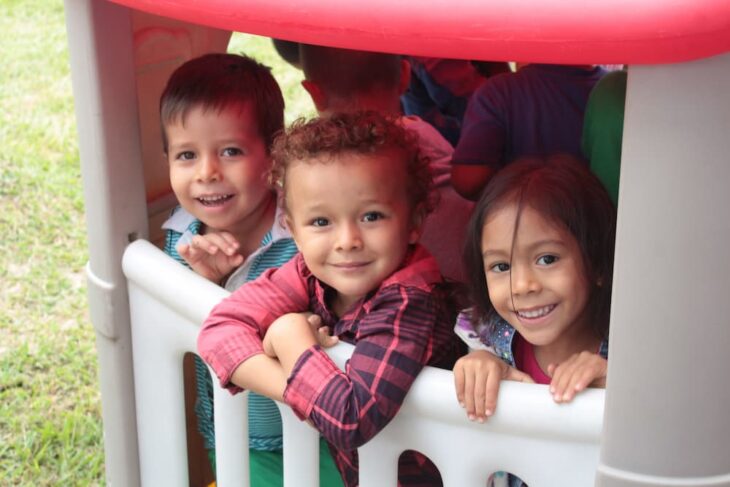Disclosure: Articles may contain affiliate links. As an Amazon Associate, we earn from qualifying purchases (at no additional cost to you). See our full disclosure here.
Last updated on February 1st, 2023 at 11:05 pm
We all want to raise happy, healthy children. Most parents hope their children will be successful academically and professionally too. We also strive to make sure our kids are good human beings.
It’s not something you may have thought much about, but cultural upbringing is another important part of parenting. Children need to know about the culture and history of their parents, learn about their cultural identity, appreciate other culturals, and understand how these culture and traditions fit into the larger society.
Of course, parents are the biggest influencers when it comes to their children’s development, and this holds true when it comes to cultural identity as well. Parents can make sure their kids take part in cultural events and activities, share holiday traditions, books, and films–even food plays a part in shaping cultural identity.

What Is Cultural Upbringing?
Cultural upbringing refers to the influence of parents on their children that helps them understand their background, teaches them to welcome and appreciate cultures from around the world, respect human dignity, and gain social awareness.
It gives the kids a sense of who they are, how they fit into the world, and how they should interact with the people around them.
A healthy social and cultural upbringing will influence a child’s behavior at school, at home, and throughout their life.

How Does Their Cultural Upbringing Affect Your Child’s Development?
Many experts believe that cultural identity and interactions affect children in three specific areas. They are:
Personality
A person’s cultural upbringing plays a huge role in the development of their personality. This is expressed in various ways:
- It helps the child get along better in social situations because of their ability to understand and appreciate everyone.
- It helps in self-recognition.
- Upbringing affects a person’s moral development. The young person will be able to adopt his or her own, as well as society’s, ethical and moral norms.
- It helps them express their creativity.
- It helps in their spiritual development.
- A healthy cultural upbringing impacts one’s parenting style as well. It helps determine the kind of parent the child will become in the future.
Behavior
We all know that our upbringing influences our behavior. Parents help young children learn about the beliefs, values, and traditions of their families.
When they grow up, they can decide for themselves which part of the culture to reject or accept. They have the freedom to decide.
However, there is also a pessimistic view, which says that cultural training forces children to feel, believe, and think in a particular way. According to this view, a child’s upbringing may influence their actions and behavior in a negative way.
There is the ‘nurture versus nature’ debate. Some people believe that we are trapped in our genes. But others feel that children are ‘blank slates,’ and can be trained and taught to become anything.
Yes, some aspects of our behavior and personality are built-in at birth. But the human brain is very flexible. It grows and changes with education and experience.

Learning
According to the American Psychological Association, many present-day scientists and experts are looking at how the cultural environment can influence the learning processes. The researchers are looking at various possibilities to:
- Improve the ability of children to integrate into society
- Improve the desire for self-improvement
- Use complex interactions to improve the social skills of students
Education and culture are closely related. The interactions happen in various ways–through society at large, at the social level, and also at the academic level.
The goal of adolescent development is to help children form both moral and spiritual values, teach the value of tolerance, instill humanity, and a feeling of responsibility.
Through education and a good cultural upbringing, the child gains a better appreciation of their own values and their various cultural differences and commonalities. That, in turn, helps them gain a better understanding of the world.
How Do Parents Influence Their Child’s Behavior?
Parents and family members have the biggest impact on the behavior of their children. Parents teach their kids the family norms, including what is acceptable and unacceptable behavior, knowledge of family traditions, ethnic history, values, and more.
Whether we realize it or not, this has been passed down to us by our parents, and we live these cultural traditions every day, modelling them for our own children.
Everything a child learns from their family and about their family begins from birth. Living the culture and beliefs of the family becomes the basis of the child’s identity. Through family life and by watching the parents, children will gradually gain awareness about their family’s cultures and customs, which will give them self and social awareness. This is why parents need to be positive role models. This can be done through celebrating traditions and holidays, through books, and even in the way the parents communicate.
Parenting around the world varies as there are so many different customs and traditions. But, values, for the most part, are the same. They include human rights, moral values, self-recognition, self-regulation, and socialization.

Why Is It Important To Learn About Culture
Each person is a product of her or his background, lessons learned as a child, experiences from social interactions, and upbringing. A solid upbringing creates healthy, happy children and well-rounded adults who respect others and are happy with themselves.
How Does Their Cultural Upbringing Affect Your Child’s Development? | #family #parenting Click To TweetAlso read:
Teach Kids to Practice Kindness (30 Ideas + a Free Printable)
30 Great Ways to Make Memories With Your Child — Free Printable
Mini Moments Worth Celebrating
You can find MomsWhoSave on Facebook, Instagram, Pinterest, and Twitter. Join us for updates!

Leave a Reply